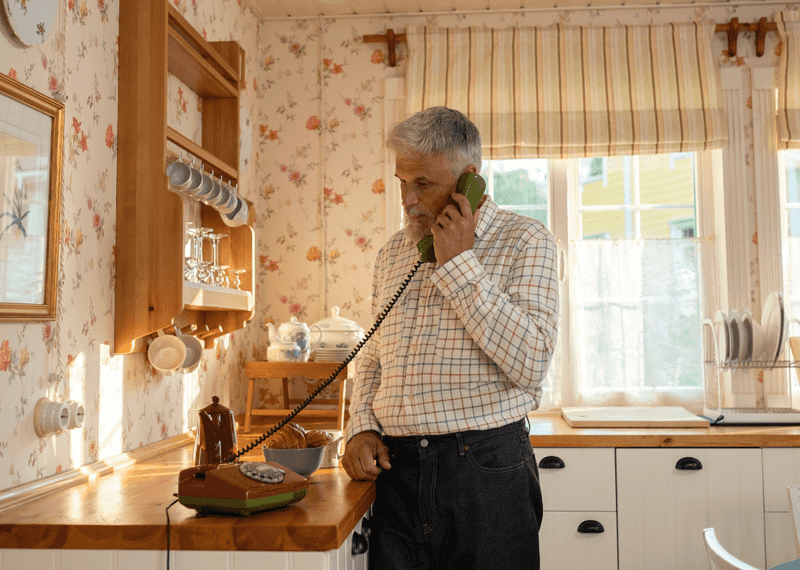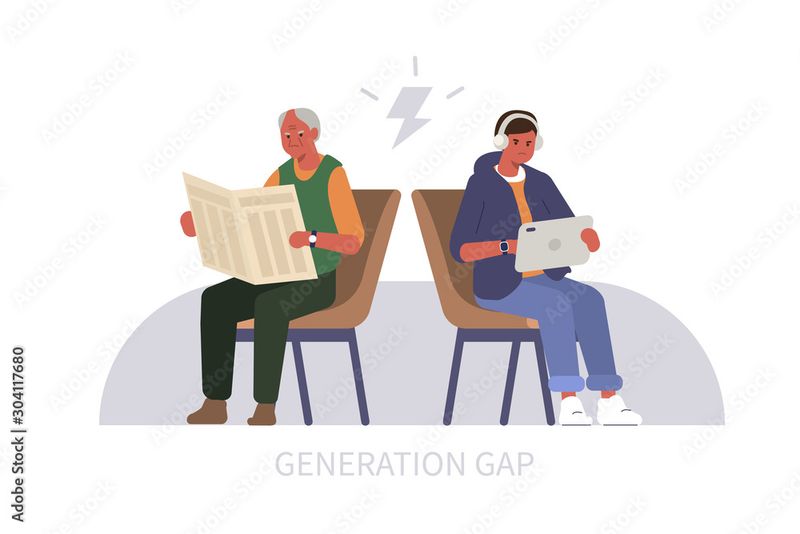Shifting Sands: 16 Things Baby Boomers Are Increasingly Saying “No” To
Let’s skip the small talk—I know you’ve felt it. That distance, that quiet resistance from your parents or your older neighbors, the way they look at all this “new stuff” with a mix of confusion and flat-out determination.
Baby Boomers are done pretending everything new is automatically better. They’re not being stubborn for the sake of it. They’ve just spent decades watching fads come and go, promises get broken, and “must-have” inventions turn into dust collectors.
So now, they’re choosing what fits and what doesn’t—no apologies. If you ever wondered why your mom clings to her landline or your dad still wears a tie for Zoom meetings, it’s not about nostalgia. It’s about drawing a line in the sand.
Here’s the real talk on 16 things Baby Boomers are standing their ground on, and why it’s not as simple as “they just don’t like change.”
1. Digital Payments Over Cash

You can see it in the way my dad hesitated at the self-checkout, clutching a twenty like it was a lucky charm. Digital wallets and chip cards sound convenient, but for him? Cash is proof—of a deal, of effort, of something real.
He tells me he likes the weight of it, the finality. He says, “When I hand over money, I know exactly what’s leaving.” I get it. When you’ve watched recessions and bank errors, trust isn’t just given to an app.
Maybe this is more than reluctance. For many Boomers, cash gives them a sense of security and control that screens can’t match. They’re not saying no to progress; they’re saying yes to what settles their nerves.
2. Text Messaging Over Phone Calls

My grandma still answers every call like it’s news from the front. Texts? She reads them, eventually. But she misses the sound of laughter, the real pauses, the way a conversation can loop back or go sideways.
She once said, “A text can’t tell you if someone’s holding back tears.” That hit me. For Boomers, the phone call is a lifeline—messy, alive, impossible to edit.
Maybe they resist texting because it feels like a shortcut through connections that once meant everything. For them, sometimes a ring is better than a ping. And honestly, who can blame them?
3. Embracing Streaming Services Over Cable TV

You know those nights when the cable guide was your map and you never worried about buffering? Many Boomers still flip through every channel and grumble about apps asking for passwords and updates.
Streaming is a maze to them—too many choices, too many subscriptions. They’d rather trust their old cable box, even if half the channels play reruns.
Older folks aren’t just being nostalgic. For them, cable is familiar, reliable, and doesn’t require a second device or another password. It’s not about being stuck in the past; sometimes, it’s about sticking with what makes sense.
4. Adapting to Online Shopping

I watched my mom run her fingers over a sweater in a store—she checked the seams and stretched the cuffs. She trusts her senses more than glowing reviews or next-day shipping.
Online shopping feels risky to her. She’s worried about returns, scams, things looking better on screens than in life. For her, shopping is a ritual, not just a transaction.
When Boomers say no to e-carts, it’s not because they can’t adapt. They crave certainty, connection, and the quiet joy of picking something that feels right. That can’t be shipped overnight.
5. Using Landline Phones

If you ever wondered why that clunky phone still sits in the hallway, it’s not just for show. My grandpa called it the “lifeline”—reliable, with a sound that meant business.
Cell phones run out of battery; they get lost in couch cushions. But the landline? It’s always there, grounded, heavy in your hand. It doesn’t update or crash.
Boomers aren’t tech-averse—they just trust what’s proven. A landline is steady, unapologetically old-school, and for a generation used to bad news at 3 AM, that dial tone brings comfort nothing else can.
6. Maintaining Traditional Work Attire

My dad ironed his shirts even during lockdown. He said, “It makes me feel ready.” To him, a tie wasn’t just fabric—it was armor, a silent promise that he took the day seriously.
He winced at the idea of hoodies in boardrooms. For Boomers, business wear signals respect for others and for the work itself. It’s about dignity, not trends.
You might laugh at dress codes, but for them, standards meant you belonged. When they say no to casual Fridays, it’s not snobbery—it’s a way of holding on to pride.
7. Preserving Physical Media

Crates of records, towers of tapes—my parents’ media shelf is a time capsule. Every scratch on a vinyl or scuff on a DVD tells its own story.
Digital files vanish with a hard drive crash, but physical media is stubborn, real, and oddly comforting. It’s the sound of Saturday mornings, the ritual of flipping covers.
Boomers keep these artifacts because they’re anchors. Each album, each movie, holds a memory you can pull out and hold, not just stream and forget. There’s weight to that.
8. Prioritizing Face-to-Face Communication

There’s magic in real presence. Baby Boomers light up when someone sits across from them and actually talks with them.
For them, face-to-face time is sacred. Every wrinkle in conversation, every shared silence, says more than emojis ever could.
It’s not about rejecting tech; it’s about defending intimacy. When they choose coffee over DMs, it’s a quiet act of rebellion—a way to remember what truly matters.
9. Valuing Traditional Banking Methods

You know the ritual—deposit slips, a ballpoint pen chained to the counter, the teller who knows your birthday. So many Boomers still drive to the bank every Friday.
If you ask them, they all say the same: “I want to see where my money goes.” Online portals make them uneasy. They want a handshake, a paper receipt, the reassurance that someone’s watching out.
For Boomers, banking isn’t a faceless transaction. It’s trust, built person-to-person. Maybe slow, maybe old-fashioned, but it makes them feel seen—not just another username.
10. Holding onto Physical Photo Albums

There’s something vulnerable in the way my grandma keeps the photo albums out, not boxed away. She says digital galleries feel cold—memories shouldn’t need passwords.
She runs her hand across faded Polaroids and laughs at the haircuts. For her, each photo is proof: birthdays, bad days, love that lasted.
Boomers keep albums because they’re more than nostalgia. They’re evidence of a life lived, something to share around a table—not just swipe through alone.
11. Letting Go of Handwritten Letters

A shoebox of letters holds more than words. Many Boomers cherish and hold on to old notes from friends, even though the paper’s soft with time.
They say: “You can’t smell ink on an email.” For Boomers, handwritten letters are proof someone cared enough to slow down, to leave a piece of themselves behind.
They’re saying no to emails as replacements for something deeply personal. The weight, the imperfections, the stamps—mailbox love can’t be replaced by instant replies.
12. Using Social Media for Connection

You’ll spot them outside, dirt on their hands, not a selfie in sight. For Boomers social media feels like shouting into the void.
Likes and comments don’t fill them up—they crave laughter on their porch, voices they can actually hear. Boomers would rather host a barbecue than rack up friend requests.
They aren’t anti-social. They just prefer their connections unfiltered, face-to-face, where conversations linger and nobody’s counting followers.
13. Open Office Layouts

They miss the door they could close, the four walls that gave them space to think. I bet you heard a Boomer say: “Cubicles meant privacy—open offices feel like surveillance.”
Noise, constant movement, no space to recharge. For them, work required focus and respect for boundaries. Open spaces can feel chaotic, not creative.
Their no isn’t about resisting modern work culture. It’s about protecting sanity, claiming the right to a little peace, even in a crowd.
14. Abandoning Paper Newspapers

The smell of ink, the rustle of pages—Boomer’s morning starts with headlines on newsprint, not a glowing screen.
They trust the editors they grew up with. Apps feel noisy and overwhelming. For them, the paper offers a pause, a way to connect with the world at a human pace.
Boomers hold onto newspapers because they trust what’s tangible. It’s their daily ritual, not just for news but for grounding themselves before the day spins out.
15. Minimalist Home Design

You walk into their home and it hits you—layered rugs, framed memories, a hundred tiny treasures. For them, every object tells a story.
Minimalism, all blank walls and empty shelves, feels sterile to Boomers. They grew up collecting, not tossing, finding meaning in clutter.
They say no to pared-down living because fullness feels like home. Their rooms are stories, not showrooms, and they wouldn’t have it any other way.
16. Rushing Retirement

They laugh when people ask when they’ll retire. “Why would I stop doing what I love?” For many Boomers, work is purpose—not just a paycheck.
The idea of retiring early feels off. They grew up with the idea that identity is tied to contribution, to staying engaged.
This isn’t about refusing to rest. It’s about not letting age decide when it’s time to fade out. For Boomers, “retirement” isn’t a finish line. It’s a choice, not a rule.







